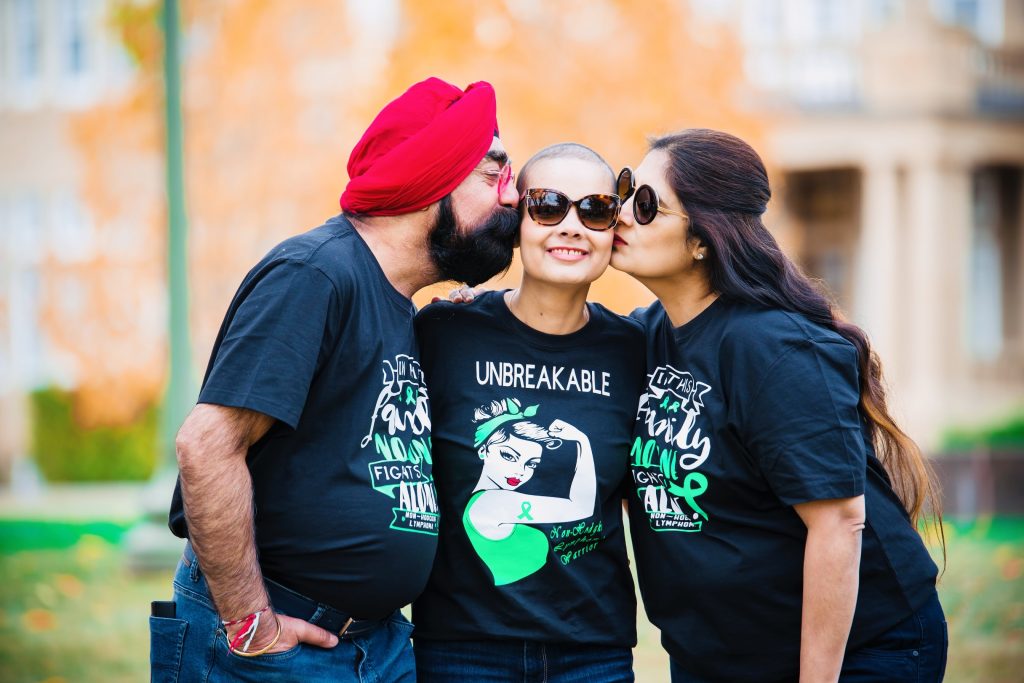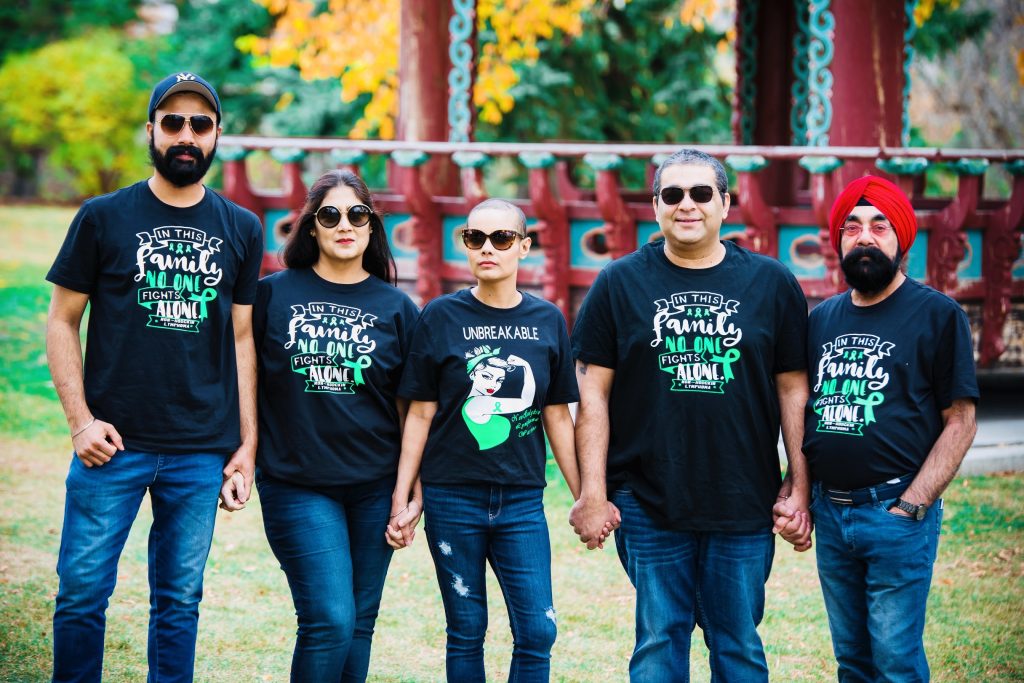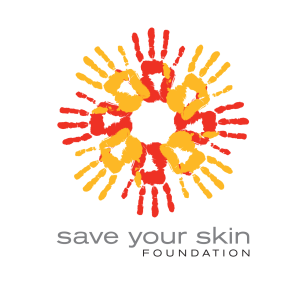World Cancer Day is on February 4th and is a day to spread awareness of cancer as a whole and to encourage its prevention, detection and treatment. This year, we had the pleasure of speaking with Harjeet Kaur, a stage 4 rare blood cancer survivor who, after her diagnosis, became a wonderful advocate for other cancer patients and caregivers. Her story is one that encompasses the confusion, fear, and ultimately willpower that comes along with a cancer diagnosis. We thank Harjeet for sharing her story with us and giving us insight into her incredible resilience.
Can you share a little bit about your personal journey with cancer? When were you diagnosed and what emotions did you experience at that moment?
Harjeet Kaur: My story has been interesting. I migrated to Canada in 2018 with high hopes of settling down, having a family and having a better career. But life had different plans for me and my world completely flipped upside down in 2019, when I started having high fevers which were ongoing for two and a half months. I went to the doctor but the only answers I really got was that it might be viral or a flu and to take Tylenol every 2 hours to cut down the fever. Along with fevers I started having rigour episodes daily. I went to the emergency room so many times, and had to wait for 6-8 hours to get answers and those times were really challenging for me. Finally, I was admitted to the University of Alberta hospital where I was treated as a research patient because no one knew what was going on with me. I had a couple of biopsies, surgeries and scans but there were no answers. It took them 3 months to diagnose me, and when I finally figured out what was going on it was August 27th, 2019. At that point I was going to move back to India to get some answers, but the doctor rushed in and told me I had stage four, rare blood cancer. I was 32 at the time and I had no idea that was. The doctor told me that they thought I should stay in Canada because I was stage 4 and had to start treatment right away. Listening to that news, my life completely stopped – I was in shock. My mom and brother were there with me, my husband had gone to see my family doctor to plan my move back to India, but then I called him and told him I had the diagnosis – I couldn’t tell him on the call that I had stage 4. After not having answers for a few months, to hear that I was stage four was really shocking. To get a late diagnosis at age 32 was something I never would have expected – it was a rollercoaster ride.
How long were you able to start treatment after you were first diagnosed?
Harjeet Kaur: They did a skin biopsy which finally showed the diagnosis after 3 months. As soon as I got the diagnosis in the afternoon, they wanted to admit me right away and start the treatment as I was losing time. But we asked them for a few hours to process the news. Since it was 3 months delayed, we wanted to connect with our family doctor and the medical team we were talking to in India and update them. So I actually ended up starting chemotherapy the next day.
World Cancer Day is about raising awareness and taking action. What message would you like to convey to those who may be facing a cancer diagnosis for the first time?
Harjeet Kaur: As we all know, cancer is tough. Not only for the person, but also for the family. Going through the diagnosis, treatment during COVID (35 days of isolation) – all of it is tough. The number one thing I would tell someone who is facing a cancer diagnosis is to not lose hope. There are a lot of support groups and communities out there who can help. You can also ask for help from your friends and family. You don’t have to face this journey alone.

Absolutely! It sounds like your family were great caregivers to you throughout your diagnosis and treatment. What advice would you give to someone who is a caregiver for someone with cancer?
Harjeet Kaur: Caregivers play a really important role. I noticed that my caregivers never asked for anything, they only showed me love and support. That was something important for me to understand, that my caregiver was going through the same journey as I was. Especially because of how young I was, my entire family was in shock so I think it was difficult for them to see me like that. So the advice I would give to both patient and caregiver is to try to understand each other’s feelings and that treatment is going to be really hard. It can be hard to act like your normal self around that person because it’s difficult to see someone you love going through treatment and pain, and sometimes a patient won’t be able to express their feelings because of that. So it’s just you have to balance it out to understand each other’s experiences and thoughts and what they are feeling.
Yeah, I agree. It seems like both people are trying to be strong for the other one.
Harjeet Kaur: Definitely. I remember I constantly told myself to be strong for my family. I used to cry when I was alone because I didn’t want people to see me like that. I thought that if I show them that I’m breaking down, they’ll break down with me. That willpower really kept me strong and it did help sometimes to put on a brave face. To that point, another piece of advice is to keep a positive mindset, you really need to stay hopeful.
What strategies did you use to help yourself stay positive throughout your treatment and diagnosis?
When I was told that I was diagnosed with cancer, I really didn’t think that I’d be here today. But during the whole process of my journey, my family and friends were the things that kept me going. The only time I lost hope was during the stem cell transplant. When I was told that I had to be isolated for 35 days, I really thought I wasn’t coming back and that that would be the last time I would be able to hug my family. But during those 35 days, I just kept praying for the next day. I wanted to see my family again more than anything. So that hope and that strength within myself kept me going. And now here I am. I never thought I’d be strong enough to go through cancer or a stem cell transplant all by myself. It’s just important to not lose hope and to keep trying your best. Even when I was alone for those 35 days, I used to FaceTime my family just to listen to them. So you need to do whatever you feel will help whether it’s writing a blog, reading a book, going out in nature if you can. It’s really important how you keep yourself busy and positive during a journey like that.
Definitely. You’ve become such a big advocate for other cancer patients. You said you started writing your blog while you were in isolation for the stem cell transplant, how did you start to build on that and find a community?
The blog started because as I mentioned, when I was dropped at the hospital, I thought that I wasn’t going to go back so I really started writing some of my thoughts so that my family could read my experience, just in case. When I got home, I kept on writing about my journey. It took me 6-8 to start to feel like myself again after the stem cell transplant. I was like a newborn and was completely bedridden. The 100 days after the stem cell transplant was crucial for all of us, but I was getting better every day. I was trying to find someone who had the same kind of cancer as me, because it was so hard to find answers and information online. I reached out to the Canadian Cancer Society to see if I could find someone who had a similar diagnosis, and then after that I connected with the YACC and became their Junior Leader and it spiraled from there. I started participating in all of these events and initiatives virtually (because of COVID) and listening to other people’s experiences gave me that strength and motivation to do something about spreading awareness. My passion is to spread awareness for early detection, because for me I was diagnosed at stage 4, which I think about sometimes. Like, what if I was diagnosed at stage 1? Those three months meant I lost my fertility, vision in my right eye as well as other side effects. It’s so important to advocate for your own health. Especially if you’re a young person, you are often not taken seriously because of your age. If you feel something is wrong, go to the doctor and push as hard as you can to get the answers.
Yeah, definitely. So you would say overall, your experience within the Canadian health system was that it’s difficult to navigate, because you are a young person?
Yeah. It was also tough because as an immigrant, you don’t have a lot of connections at the beginning. And then you have to fight with your family doctor to get answers. I remember when I first went to the doctor for my fevers they told me it was a viral fever, but I knew that something wasn’t right inside my body. I never thought I’d become an advocate for others because of my diagnosis, because all it really was then was me advocating for my own health. We advocated really hard during the pre diagnosis for all of my tests and scans to be done. So I feel like when you’re young and when you have common symptoms, like a fever, no one takes you seriously. And who would have thought that fevers would lead to stage 4 cancer! So similarly, I think the education and awareness piece is really important. Being young doesn’t mean that we can’t get cancer. Cancer doesn’t care what race, religion or age you are.

What do you think is the best way for someone to be able to advocate for themselves in the medical system?
In the medical system, I would say it’s really difficult but there are support groups and communities out there which can help you. Even events that teach you how to ask for things in the medical system are great. When it comes to someone’s health, you have to fight, whether it’s with the medical team, the government, public health, or whatever. You also have to have those relationships with your oncologists and doctors so that they can help guide you. Also if you have questions, make sure to ask them, even if you feel like they’re small.The more questions you ask, the more answers you will get and that leads to advocacy too!I still go for my follow ups every three months and I ask them about any small symptom I have to be sure. You need to ask and educate yourself whether it’s within the doctor’s office or in a support group.
Yeah, absolutely. I think that’s very good advice. What do you think are some things that people can do whether or not they have a cancer diagnosis themselves or their caregiver, but the average person, what do you think they can do to contribute to raising awareness and supporting cancer research across the board?
For people who are touched with cancer, it’s great to spread awareness by joining communities and support groups and helping them spread and share their message. So many of them do research programs so supporting those is a great start. Helping patients is also really important, whether it’s offering to drive someone to an appointment, making them food or something else. Any small kind of help really means the world in these situations. I know it’s really difficult for a person to express their feelings around having cancer and there can be a lot of stigma around cancer, especially in the South Asian community. So talking to a patient about it is actually a good thing because it shows them that you’re being present for them and are giving them the opportunity to talk if they would like to.
We thank Harjeet for sharing her story and we urge everyone to unite and take action to improve access to pre-screening, testing and quality care. To read more about Harjeet’s story and to get in touch with her, click the button below.


